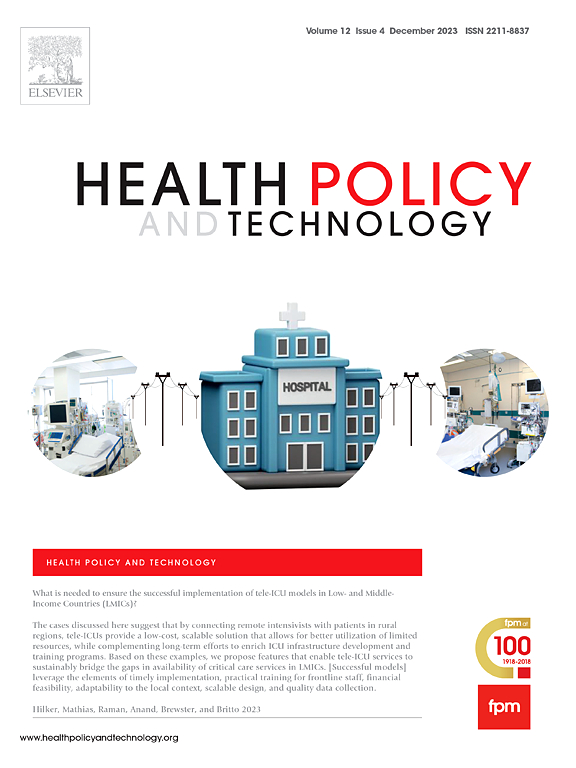Taiwanese healthcare providers’ attitudes regarding reprocessing and reuse of single-use devices
IF 3.7
3区 医学
Q1 HEALTH POLICY & SERVICES
引用次数: 0
Abstract
Objectives
Reusing medical single-use devices (SUDs) has been increasing worldwide. However, there is limited understanding regarding healthcare workers’ perceptions of SUD standards and regulations. The study examined knowledge of and attitudes towards SUDs in Taiwanese healthcare providers.
Methods
Overall, 900 healthcare providers from 20 cities/counties in Taiwan participated in a nationwide cross-sectional study. A questionnaire based on recommendations from the Infection Control Society of Taiwan was developed and it demonstrated good psychometric properties (Cronbach's alpha= 0.66-90). The questionnaire assessed SUD-related knowledge, opinions, institutional/administrative policies, quality control, and institutional safety procedures. Linear regression models investigated associations of SUD-related factors with participant characteristics.
Results
Although most participants (90 %) knew that unprocessed SUDs should not be reused and may threaten patients, approximately half supported SUD reuse and were confident that their institutions could reprocess SUDs. Almost all participants (>95 %) supported standard protocols for reprocessing of SUDs. Institution type (medical center vs. regional/district hospitals) and work experience related to views on SUD reuse/reprocessing (p<0.05).
Conclusions
Despite positive attitudes of Taiwanese healthcare workers toward SUD reprocessing/reuse, many did not have adequate knowledge regarding current standards/regulations in their worksite. Designing interventions to promote Taiwanese healthcare workers' awareness of the common regulations or guidelines related to SUDs reprocessing/reuse is suggested.
台湾医疗保健提供者对一次性器械再处理和再利用的态度
目的医用一次性器械(sud)的重复使用在世界范围内呈上升趋势。然而,对于医护人员对SUD标准和法规的理解有限。本研究调查台湾医疗服务提供者对sud的认知及态度。方法对台湾省20个市/县的900名医疗服务提供者进行了全国性的横断面研究。根据台湾感染控制学会的建议,编制了一份问卷,显示出良好的心理测量特性(Cronbach’s alpha= 0.66-90)。问卷评估了sud相关的知识、意见、机构/行政政策、质量控制和机构安全程序。线性回归模型研究了sud相关因素与参与者特征的关系。结果虽然大多数参与者(90%)知道未处理的SUD不应该重复使用,可能会威胁到患者,但大约一半的参与者支持SUD重复使用,并相信他们的机构可以重新处理SUD。几乎所有与会者(95%)都支持sud再处理的标准方案。机构类型(医疗中心vs.区域/区级医院)和工作经历与SUD再利用/再处理意见相关(p<0.05)。结论尽管台湾医护人员对SUD的再处理/再利用持积极态度,但许多人对其工作场所的现行标准/法规缺乏足够的了解。建议设计干预措施,以提高台湾医护人员对sud再处理/再利用相关的共同法规或指南的认识。
本文章由计算机程序翻译,如有差异,请以英文原文为准。
求助全文
约1分钟内获得全文
求助全文
来源期刊

Health Policy and Technology
Medicine-Health Policy
CiteScore
9.20
自引率
3.30%
发文量
78
审稿时长
88 days
期刊介绍:
Health Policy and Technology (HPT), is the official journal of the Fellowship of Postgraduate Medicine (FPM), a cross-disciplinary journal, which focuses on past, present and future health policy and the role of technology in clinical and non-clinical national and international health environments.
HPT provides a further excellent way for the FPM to continue to make important national and international contributions to development of policy and practice within medicine and related disciplines. The aim of HPT is to publish relevant, timely and accessible articles and commentaries to support policy-makers, health professionals, health technology providers, patient groups and academia interested in health policy and technology.
Topics covered by HPT will include:
- Health technology, including drug discovery, diagnostics, medicines, devices, therapeutic delivery and eHealth systems
- Cross-national comparisons on health policy using evidence-based approaches
- National studies on health policy to determine the outcomes of technology-driven initiatives
- Cross-border eHealth including health tourism
- The digital divide in mobility, access and affordability of healthcare
- Health technology assessment (HTA) methods and tools for evaluating the effectiveness of clinical and non-clinical health technologies
- Health and eHealth indicators and benchmarks (measure/metrics) for understanding the adoption and diffusion of health technologies
- Health and eHealth models and frameworks to support policy-makers and other stakeholders in decision-making
- Stakeholder engagement with health technologies (clinical and patient/citizen buy-in)
- Regulation and health economics
 求助内容:
求助内容: 应助结果提醒方式:
应助结果提醒方式:


